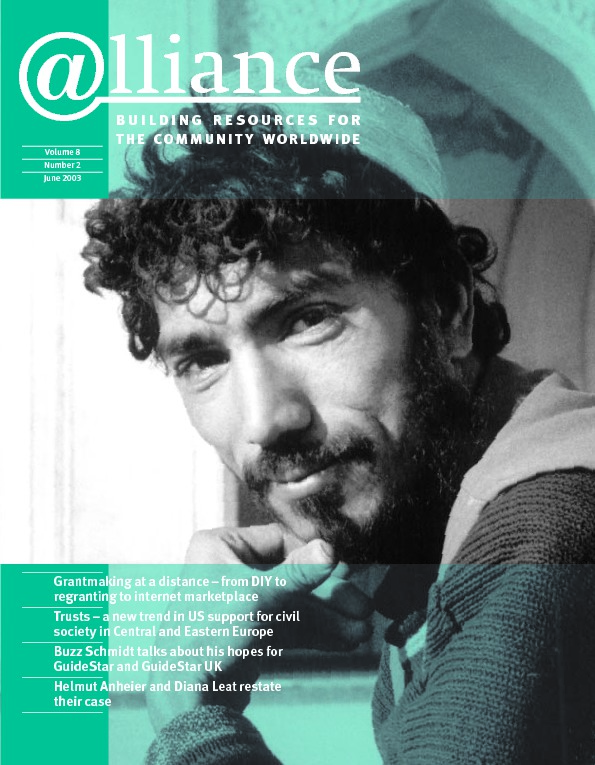Repeat after me: ‘Expatriates are essential for successful international aid.’ Just saying the words reveals how dated and offensive such an idea is; yet the northern-controlled system for development and relief programmes – state funders to foundation grantmakers – seems to prize that ethos.
From Darfur’s desert war to Asia’s tsunami recovery, skilled southern individuals and communities, indigenous agencies and regional networks – from the Red Cross to the African Union – are doing their best to foster sustainable growth or save the lives of those hit by calamities and conflict.
They merely lack those three ingredients that international donors and northern agencies have aplenty yet seem reluctant to set free for full impact: cash, political influence and media attention.
Yet even before the Make Poverty History campaign lobbied the G8 meeting to cancel debt, raise aid and end trade inequities, northern donors and agencies were urged to let those at the front line in the developing world take the lead.
Both Africa’s continuing crises and Asia’s sudden catastrophe offer clear lessons why the centre of aid’s gravity should tip their way, and both contain examples of how developing world groups are helping each other to throw off the less than benign patronage of North-South ‘partnerships’ that never cede power.
In Africa, if they can hold onto staff being poached by northern agencies, skill levels among NGOs are rising fast, as is their commitment to tackle their continent’s troubles and fulfil the frontline role international donors have long called on them to perform.
They know what they need: at a conference in Addis Ababa organized by regional relief agency Africa Humanitarian Action in December 2004,[1] representatives of hundreds of indigenous NGOs urged that at least 25 per cent of humanitarian aid to Africa be spent directly through frontline agencies, with sustainable funding for core costs and infrastructure, such as training and communications.
That call for ‘real aid’ includes creating a think-tank, the Centre for Humanitarian Action, to support research, analysis and capacity-building for the growing army of cash-starved indigenous organizations offering high-quality work.
Today’s reality is what the ActionAid network dubbed ‘phantom aid’, in which most assistance, even if ‘untied’, is consumed by outside consultants and companies, or absorbed by governments, UN organizations and northern charities in costly salaries, pensions and perks.
In Asia, where the term phantom aid might just as easily be applied to the billions pledged or donated yet sitting unspent in northern bank accounts, expatriates arrived in droves after the tsunami to find generally good logistical links, functioning governments, extensive faith networks, and countless local NGOs.
Having mostly resisted the obvious – sending money to their supposedly trusted long-term local partner groups – the new arrivals also discovered indigenous agencies hard at work with millions of dollars donated via the internet, banking channels or informal networks from worldwide diaspora communities.
Through remittances home, diasporas offer a poor-to-poor support network worth $120 billion a year (double all official aid flows), yet the potential for this funding to assist development or tackle disasters is only slowly being realized.
One route would be to set up, as both the World Bank and European foundations are exploring, southern community foundations to channel expatriate-free aid funds, disaster donations and diaspora remittances – incentivized by tax breaks and matching funds – for use in crises, rehabilitation and development.
Such real aid under local control, together with money diverted from northern agencies, cross-border internet philanthropy, commercial income and fees for outsourced state services, could provide sustainable funding to frontline groups that have so many advantages over fly-in, fly-out foreigners, from indigenous knowledge, language skills and cultural sensitivities to lower costs and a faster response.
Northern aid agencies should realize that their days of post-colonial patronage are over and become true partners, offering supportive fundraising, advocacy and trust. When pressed, they often declare they aim to work themselves out of a job. There’s a simple and quicker way to let local agencies take over the driving seat of aid: hand over the keys to the Toyota. Now.
Nick Cater is a writer and consultant specializing in development issues. He can be contacted at wordspicturesuk@yahoo.co.uk
1 Details of the Addis Ababa conference and the Centre for Humanitarian Action can be found on Africa Humanitarian Action’s website at http://www.africahumanitarian.org
(c) Copyright 2005 Nick Cater/Words & Pictures


Comments (0)